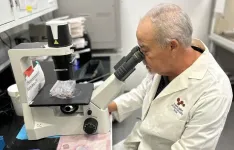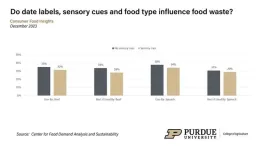(Press-News.org) For the first time, researchers have analysed the impact of antibiotic use on the rise of treatment-resistant bacteria over the last 20 years in the UK and Norway. They show that while the increase in drug use has amplified the spread of superbugs, it is not the only driver.
Researchers from the Wellcome Sanger Institute, the University of Oslo, the University of Cambridge, and collaborators, conducted a high-resolution genetic comparison of bacteria. They compared over 700 new blood samples with nearly 5,000 previously sequenced bacterial samples to answer questions about what factors influence the spread of antibiotic-resistant Escherichia coli (E. coli).
The study, published today (11 January) in the Lancet Microbe, shows that greater antibiotic use does drive an increase in treatment-resistant bacteria in some instances. However, researchers confirmed that this varies depending on the type of broad-spectrum antibiotic used. They also found that the success of antibiotic-resistance genes depends on the genetic makeup of the bacteria carrying them.
Recognising all the main factors behind antibiotic resistance can help build a deeper knowledge of how these bacteria spread and what hinders them. This could then better inform public health interventions that use a complete view of the environment to help stop the spread of treatment-resistant infections.
The bacterium, E. coli is a common cause of bloodstream infections worldwide.1 The type of E. coli responsible for these infections is commonly found in the gut, where it does not cause harm. However, if it gets into the bloodstream due to a weakened immune system it can cause severe and life threatening infections.
As an added challenge for healthcare providers, antibiotic resistance, in particular multi-drug resistance (MDR), has become a frequent feature of such infections. In the UK, over 40 per cent of E. coli bloodstream infections are resistant to a key antibiotic used in the treatment of serious infections in hospital.2
Rates of antibiotic resistance in E. coli vary globally. For example, the rate of resistance to a different antibiotic, one commonly used to treat urinary tract infections caused by E. coli, ranged from 8.4 per cent to 92.9 per cent depending on the country.3
Antibiotic resistance has been a topic of research for decades, and the surveillance data from previous studies have consistently shown an association between antibiotic use and an increased frequency of MDR in bacteria worldwide, including in the UK.
Previous studies have suggested a stable coexistence of resistant and non-resistant E. coli strains and in some cases, the non-resistant bacteria are more successful. However, previously it was not possible to assess the role of the genetic drivers of this due to the lack of unbiased large-scale longitudinal data sets.
This new study, from the Wellcome Sanger Institute, the University of Oslo, and collaborators, is the first time it has been possible to directly compare the success of the different strains of E. coli between two countries — Norway and the UK — and explain differences based on country-wide antibiotic usage levels.
By analysing data that spanned almost 20 years, they found that the use of antibiotics was linked to increased resistance in some instances, depending on the type of antibiotic. One class of antibiotics, non-penicillin beta-lactams, were used three to five times more on average per person in the UK compared to Norway. This has led to a higher incidence of infections by a certain multi-drug resistant E. coli strain.
However, the UK also uses the antibiotic trimethoprim more often, but analysis did not uncover higher levels of resistance in the UK when comparing the common E. coli strains found in both countries.
The study found that the survival of MDR bacteria depended on what strains of E. coli were in the surrounding environment. Due to this and other selective pressures in an area, researchers concluded that it is not possible to assume that the widespread use of one type of antibiotic will have the same effect on antibiotic-resistant bacteria spread in different countries.
The scientists stress that their results warrant sustained research efforts to identify what else drives the spread of E. coli and other clinically important bacteria across a range of ecological settings. Further research is needed to fully understand the combined effect of antibiotics, travel, food production systems and other factors shaping the levels of drug resistance in a country.
Understanding more about the strains that can outcompete antibiotic-resistant E. coli can lead to new ways to help stop the spread. For example, attempts that increase the amount of non-resistant, non-harmful bacteria in an area.
Dr Anna Pöntinen, co-first author from the University of Oslo, Norway and visiting scientist at the Wellcome Sanger Institute, said: “Our large-scale study allowed us to start to answer some of the long-standing questions about what causally drives multidrug-resistant bacteria in a population. This research was only possible due to the national systematic surveillance of bacterial pathogens that occurred in the UK and Norway. Without such systems in place, scientists would be considerably more limited in terms of what can be learnt using the power of genomics.”
Professor Julian Parkhill, co-author from the University of Cambridge, said: “Our study suggests that antibiotics are modulating factors in the success of antibiotic-resistant E. coli, instead of the only cause. Our research traced the impact of several different broad-spectrum antibiotics and shows that the influence of these varies by country and area. Overall, our comprehensive genetic analysis shows that it is not always possible to predict how the use of antibiotics will impact an area without knowing the genetic makeup of the bacterial strains in that environment.”
Professor Jukka Corander, senior author from the Wellcome Sanger Institute and the University of Oslo, Norway, said: “Treatment-resistant E. coli is a major global public health issue. While it has long been accepted that the overuse of antibiotics plays a role in the rise and spread of superbugs, our study highlights that the level of drug resistance in widespread E. coli strains can vary substantially. Antibiotic use will be one selective pressure, and our study shows that it is not the only factor that impacts the success of these bacteria. Continuing to use genomics to gain a detailed understanding of the underlying drivers of bacterial success is crucial if we are to control the spread of superbugs.”
ENDS
Contact details:
Rachael Smith
Press Office
Wellcome Sanger Institute
Cambridge, CB10 1SA
Email: press.office@sanger.ac.uk
Notes to Editors:
Kern WV, Rieg S. (2020) Burden of bacterial bloodstream infection – A brief update on epidemiology and significance of multidrug-resistant pathogens. Clin Microbiol Infect. DOI: 10.1016/j.cmi.2019.10.031
UK Health Security Agency. New data shows 148 severe antibiotic-resistant infections a day in 2021. Available at: https://www.gov.uk/government/news/new-data-shows-148-severe-antibiotic-resistant-infections-a-day-in-2021#:~:text=Over%20two%2Dfifths%20of%20E,as%20cefiderocol%20to%20identify%20resistance.
Wang. S, Zhao. S, Zhou, et al. (2023) Antibiotic resistance spectrum of E. coli strains from different samples and age-grouped patients: a 10-year retrospective study. BMJ Open. DOI: 10.1136/bmjopen-2022-067490
Publication:
Anna Pöntinen, et al. (2024) Modulation of multi-drug resistant clone success in Escherichia coli populations: a longitudinal multi-country genomic and antibiotic usage cohort study. Lancet Microbe. DOI: 10.1016/ S2666-5247(23)00292-6
Funding:
This research was funded by the Trond Mohn Foundation, Marie Skłodowska–Curie Actions, European Research Council, the Royal Society, and Wellcome. A full acknowledgement list can be found on the publication.
Selected websites:
About the Faculty of Medicine at the University of Oslo
Founded in 1814, the Faculty of Medicine at the University of Oslo is the oldest medical faculty in Norway. The Faculty's core activities are research, education, dissemination and innovation for the best of patients and society. https://www.med.uio.no/english/
About the University of Cambridge
The University of Cambridge is one of the world’s top ten leading universities, with a rich history of radical thinking dating back to 1209. Its mission is to contribute to society through the pursuit of education, learning and research at the highest international levels of excellence.
The University comprises 31 autonomous Colleges and 150 departments, faculties and institutions. Its 24,450 student body includes more than 9,000 international students from 147 countries. In 2020, 70.6% of its new undergraduate students were from state schools and 21.6% from economically disadvantaged areas.
Cambridge research spans almost every discipline, from science, technology, engineering and medicine through to the arts, humanities and social sciences, with multi-disciplinary teams working to address major global challenges. Its researchers provide academic leadership, develop strategic partnerships and collaborate with colleagues worldwide.
The University sits at the heart of the ‘Cambridge cluster’, in which more than 5,300 knowledge-intensive firms employ more than 67,000 people and generate £18 billion in turnover. Cambridge has the highest number of patent applications per 100,000 residents in the UK. www.cam.ac.uk
The Wellcome Sanger Institute
The Wellcome Sanger Institute is a world leader in genomics research. We apply and explore genomic technologies at scale to advance understanding of biology and improve health. Making discoveries not easily made elsewhere, our research delivers insights across health, disease, evolution and pathogen biology. We are open and collaborative; our data, results, tools, technologies and training are freely shared across the globe to advance science.
Funded by Wellcome, we have the freedom to think long-term and push the boundaries of genomics. We take on the challenges of applying our research to the real world, where we aim to bring benefit to people and society.
Find out more at www.sanger.ac.uk or follow us on Twitter, Instagram, Facebook, LinkedIn and on our Blog.
About Wellcome
Wellcome supports science to solve the urgent health challenges facing everyone. We support discovery research into life, health and wellbeing, and we’re taking on three worldwide health challenges: mental health, infectious disease and climate and health. https://wellcome.org/
END
Antibiotic use is not the only driver of superbugs
Researchers have analysed the rise of antibiotic resistance over the last 20 years in the UK and Norway, highlighting that antibiotic use is not the only factor in the increase.
2024-01-12
ELSE PRESS RELEASES FROM THIS DATE:
Two common biomarkers predict heart risk in asymptomatic childhood cancer survivors
2024-01-12
(MEMPHIS, Tenn. – January 11, 2024) Data from the St. Jude lifetime cohort study (St. Jude LIFE) revealed that two common biomarkers of cardiac function and damage could better predict cardiomyopathy within five years than routine clinical evaluations in high-risk, asymptomatic childhood cancer survivors. Early detection through screening using these two biomarkers may lead to earlier treatment to prevent and protect against further heart damage. The findings were published today in the Journal of Clinical Oncology.
Cardiomyopathy is often asymptomatic at onset and thus “invisible” to routine clinical evaluations. St. Jude ...
More than skin deep: A molecular look at the mechanisms behind pigmentation variation
2024-01-12
Researchers from the University of Pennsylvania have discovered key insights into the molecular basis of skin color variations among African populations. Their findings, published in Nature Genetics, broaden the understanding of human evolution and the genetics underpinning contemporary human skin color diversity.
“Despite the abundant genetic diversity within African populations, they have been historically underrepresented in genetic studies,” says senior author Sarah Tishkoff, a Penn Integrates ...
Guantanamo Bay: 22 years of indefinite detention and eroded human rights
2024-01-12
Media contacts:
Jillian McKoy, jpmckoy@bu.edu
Michael Saunders, msaunder@bu.edu
##
BOSTON, MA – January 11, 2024 marks the 22nd anniversary of the opening of the Guantanamo Bay detention camp, a facility shrouded in controversy and synonymous with indefinite detention and alleged human rights abuses. Established in the wake of the 9/11 attacks, Guantanamo has held hundreds of individuals suspected of terrorism, many without charge or trial, and under conditions widely condemned by international human rights organizations.
A Legacy of Controversy:
Indefinite Detention: Over ...
Integrative Center for Alternative Meat and Protein to launch at UC Davis Jan. 17
2024-01-11
The University of California, Davis, is leading the establishment of a new Integrative Center for Alternative Meat and Protein, or iCAMP. The center will work toward large-scale commercialization and technological advancement of alternative proteins, including cultivated meat (from animal cells grown in large fermentors), plant- and fungal-based foods, and innovative hybrids that combine conventional meat products with alternative proteins.
Bringing together leading researchers and academic institutions, industry ...
Even the oldest eukaryote fossils show dazzling diversity and complexity
2024-01-11
(Santa Barbara, Calif.) — The sun has just set on a quiet mudflat in Australia’s Northern Territory; it’ll set again in another 19 hours. A young moon looms large over the desolate landscape. No animals scurry in the waning light. No leaves rustle in the breeze. No lichens encrust the exposed rock. The only hint of life is some scum in a few puddles and ponds. And among it lives a diverse microbial community of our ancient ancestors.
In a new account of exquisitely preserved microfossils, researchers at UC Santa Barbara and McGill University revealed that eukaryotic organisms had already evolved into a diverse array ...
UTEP researchers discover compound that fights leukemia, lymphoma
2024-01-11
EL PASO, Texas (Jan. 11, 2024) – Researchers at The University of Texas at El Paso have identified a novel pharmaceutical compound that successfully kills leukemia and lymphoma cancer cells, potentially paving the way for new forms of therapy.
Renato Aguilera, Ph.D., a professor in the Department of Biological Sciences, is the principal investigator on the project that identified the promising compound, called thiophene F-8. His team’s findings were recently published in the research journal PLOS One.
“The main ...
C-path to lead new task force aimed at accelerating drug development for mitochondrial and inherited metabolic diseases
2024-01-11
TUCSON, Ariz., January 11, 2024 — Critical Path Institute (C-Path) today announced the launch of a task force focused on accelerating drug development for mitochondrial and inherited metabolic diseases. The task force will lay the groundwork for specific solutions, offering valuable insights that aim to contribute to regulatory decision-making.
C-Path’s demonstrated expertise will be leveraged to ensure success, specifically its track record in generating tangible solutions that have accelerated drug development in rare and pediatric ...
Molecularly designing polymer networks to control sound damping
2024-01-11
The world is filled with a myriad of sounds and vibrations—the gentle tones of a piano drifting down the hall, the relaxing purr of a cat laying on your chest, the annoying hum of the office lights. Imagine being able to selectively tune out noises of a certain frequency. Researchers at the University of Illinois Urbana-Champaign have synthesized polymer networks with two distinct architectures and crosslink points capable of dynamically exchanging polymer strands to understand how the network connectivity and bond exchange mechanisms govern the overall damping behavior of the network. The incorporation of dynamic bonds into the polymer network demonstrates ...
Year-end survey spotlights food safety, age-related consumer behavior, out-of-stock trends
2024-01-11
WEST LAFAYETTE, Ind. — Building off the previous month’s survey, the December 2023 Consumer Food Insights Report digs deeper into the relationships between food-date labels and the decision to discard food. The report also explores generational differences in food behaviors and reviews 2023 trends for out-of-stock items and common foods that people reported limiting in their diets over the year.
The survey-based report out of Purdue University’s Center for Food Demand Analysis and Sustainability assesses food spending, consumer satisfaction and values, support ...
Mike Norvell named 2023 Paul “Bear” Bryant Coach of the Year
2024-01-11
HOUSTON, January 10, 2024 – Mike Norvell, head coach at Florida State University, was named college football Coach of the Year at the American Heart Association’s Paul “Bear” Bryant Awards, presented by Marathon Oil. The 38th annual awards program benefits the American Heart Association, the world’s leading voluntary health organization devoted to a world of longer, healthier lives for all.
In his fourth season as the head coach at Florida State, Norvell led the Seminoles to a 13-1 overall record and an 8-0 mark in the Atlantic Coast Conference (ACC). Norvell was previously honored as the ACC Coach of the Year and was ...
LAST 30 PRESS RELEASES:
National Reactor Innovation Center opens Molten Salt Thermophysical Examination Capability at INL
International Progressive MS Alliance awards €6.9 million to three studies researching therapies to address common symptoms of progressive MS
Can your soil’s color predict its health?
Biochar nanomaterials could transform medicine, energy, and climate solutions
Turning waste into power: scientists convert discarded phone batteries and industrial lignin into high-performance sodium battery materials
PhD student maps mysterious upper atmosphere of Uranus for the first time
Idaho National Laboratory to accelerate nuclear energy deployment with NVIDIA AI through the Genesis Mission
Blood test could help guide treatment decisions in germ cell tumors
New ‘scimitar-crested’ Spinosaurus species discovered in the central Sahara
“Cyborg” pancreatic organoids can monitor the maturation of islet cells
Technique to extract concepts from AI models can help steer and monitor model outputs
Study clarifies the cancer genome in domestic cats
Crested Spinosaurus fossil was aquatic, but lived 1,000 kilometers from the Tethys Sea
MULTI-evolve: Rapid evolution of complex multi-mutant proteins
A new method to steer AI output uncovers vulnerabilities and potential improvements
Why some objects in space look like snowmen
Flickering glacial climate may have shaped early human evolution
First AHA/ACC acute pulmonary embolism guideline: prompt diagnosis and treatment are key
Could “cyborg” transplants replace pancreatic tissue damaged by diabetes?
Hearing a molecule’s solo performance
Justice after trauma? Race, red tape keep sexual assault victims from compensation
Columbia researchers awarded ARPA-H funding to speed diagnosis of lymphatic disorders
James R. Downing, MD, to step down as president and CEO of St. Jude Children’s Research Hospital in late 2026
A remote-controlled CAR-T for safer immunotherapy
UT College of Veterinary Medicine dean elected Fellow of the American Academy of Microbiology
AERA selects 34 exemplary scholars as 2026 Fellows
Similar kinases play distinct roles in the brain
New research takes first step toward advance warnings of space weather
Scientists unlock a massive new ‘color palette’ for biomedical research by synthesizing non-natural amino acids
Brain cells drive endurance gains after exercise
[Press-News.org] Antibiotic use is not the only driver of superbugsResearchers have analysed the rise of antibiotic resistance over the last 20 years in the UK and Norway, highlighting that antibiotic use is not the only factor in the increase.




